Blue Light and Sleep – What’s really happening?
You might’ve heard about blue light coming from your laptop or cell phone screen, but what exactly is it? Does it affect me? If so, how much and how do I stop it? All solid questions that I’m going to answer to the best of my ability here. As freelancers, we live with our technology, and in fact, we couldn’t do what we do without it. As common sense dictates, sitting and staring at a screen for 8-12 hours a day probably isn’t the healthiest thing for us. We’re going to take a quick look at the connection between blue light and sleep and how to improve your overall well-being with a few handy tools.
Blue Light and Sleep
What is blue light
So, if you think back to not so long ago (cough) to your elementary/middle school science classes you probably learned about light waves. How some light has long waves, and some light has short waves. Light with longer waves has less energy while those with shorter waves have more energy. I think this little graphic explains it pretty well.
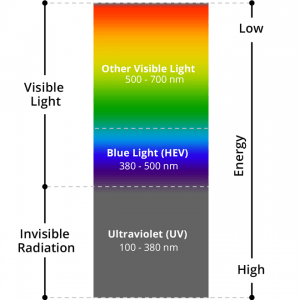
As you can see, blue waves are one of the shortest waves that humans can see. That means it has the most energy out of any visible wave. Everyone knows that the waves below it (Ultraviolet, UV) are dangerous. That’s why sunscreen protects us from UVA/UVB rays. So blue light is right on the limit. However, too much does have its side effects.
What produces blue light?
Actually, blue light is everywhere. It’s produced by the sun, digital screens (TVs, phones, computers) electronic devices, LED lighting and fluorescent lights. Your body actually uses blue light from the sun to control your circadian rhythm (your bodies internal clock that tells you it’s time to go to sleep or wake up).
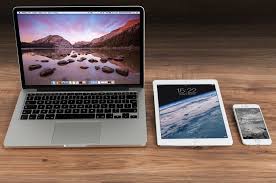
*Fun fact: When the sun produces light, the short-wave blue light crashes with the earth’s atmosphere and gets scattered. That’s why the sky looks blue.
Blue light side effects
Blue light gets a bad rap, but it isn’t all bad. It actually helps your body to regulate itself. It can even boost your mood and energy levels. When your body comes into contact with blue light, it thinks it’s daytime, and so it ramps itself up to get ready for work, school, or whatever might be on your plate for that day.
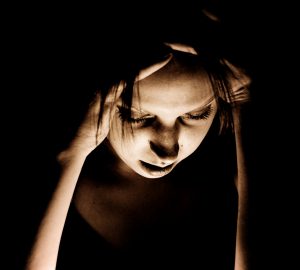
However, too much of a good thing, and all that. It’s the chronic exposure to blue light that causes problems. The list of harmful effects that it “might” cause is actually pretty scary. Harvard researchers have connected blue light exposure in people who work the night shift with a higher chance of cancer, diabetes, heart disease, obesity and a higher risk of depression. I told you it was scary. It may also cause digital eyestrain syndrome: blurry vision, dry eyes, and head and neck pain. I think we can all agree that head and neck pain is something about 110% of all adults who work with computers complain about.
It could also throw off your circadian rhythm, which is what I’m going to focus on today.
Blue light and sleep
Those same Harvard researchers realized that blue light exposure suppresses the secretion of melatonin (the hormone that makes you tired). This is a natural reaction the body has. So, when you’re exposed to blue light, your body automatically thinks its daytime and being tired during the day wouldn’t make much sense.
However, our bodies evolved when the only source of blue light was the sun. They haven’t adapted as quickly as technology, and so any type of blue light exposure (natural or artificial) will tell your body it’s daytime, even if it’s not. So imagine, you’re lying in bed at 11 o’clock at night looking at your phone, being exposed to blue light, your body thinks it’s daytime, but you’re trying to go to sleep. I think you can see where the problem with blue light and sleep comes into play.
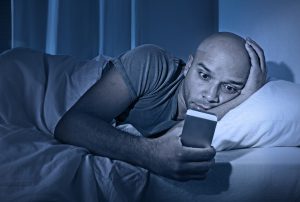
The sleep you do get, eventually, won’t be as deep or as quality as it should be for your body to repair itself. So, the next day you’re tired, your mood suffers, your work quality dips, etc.
As freelancers, if our work suffers just one time, one bad review, one lost client and things start to get really hairy. Sleep and being on top of our game every day is incredibly important and it all starts with a good nights sleep.
Is blue light really that bad?
Now we know what blue light can do and what it’s linked to, but how much is blue light and sleep connected and what’s the real effect? There was a different study from Harvard, where participants were assigned to read an iPad for 4 hours before bed and others who were assigned to read a printed book for 4 hours for 5 consecutive days.
This study agreed with the one above that blue light did reduce melatonin secretion (again, melatonin is your sleep hormone) but that the difference in the amount and quality of sleep was “minimal“. The difference in the amount of sleep and the amount of REM sleep (the deep sleep your body uses for recovery) was about 10 minutes. That means those who read a book feel asleep on average 10 minutes fast than those who read on an iPad and had 10 more minutes of REM sleep.
There were also no significant differences found between total sleep time, sleep efficiency, or duration of deep sleep and other non-REM sleep stages.
However, take this study with a grain of salt as it was only for 5 days and we’re talking about chronic exposure to blue light. Do you know anyone who’s only looked at their phone for 5 days before sleeping and then given stopped? Ya, me neither.
So, what does all this mean about blue light and sleep?
What I’m saying is that blue light does make a difference in your sleep quality even if it’s small. You probably won’t feel the effects of blue light and sleep today, it may not be tomorrow or even this month, but if you were to “only“ miss 10 minutes of sleep a night over the course of a year, that would be 60 hours a year which is you losing the equivalent of more than 1 week worth of sleep.
Do I think that looking at your phone before bed will cause cancer? Not directly, no. Will it help you not develop cancer? Definitely not! I understand that the difference may be minimal but I’m in this game for the long-term and as we all know the compound effect of small actions over time can make a huge difference, either negative or positive based on your actions.
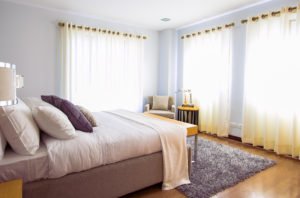
I don’t think you need to be freaking out about blue light and sleep, but I do believe in the power of making healthy choices the norm in your life. Putting down your phone or not watching t.v. a few hours before bed could set you on a more positive path, so you make another healthy choice tomorrow and the day after that letting a positive compound effect take hold.
It’s all about the mindset
It’s very difficult to study mindset, but as an example, a study conducted by Hunch.com with 68,000 participants found that 71% of those who make their beds consider themselves happy, while 62% of those who don’t, claim to be unhappy. As this is correlational, it just means that you have a better possibility of being happy if you make your bed.
I understand that making your bed has nothing to do with blue light and sleep, but it does have to do with your mindset about making healthy choices and doing things because you “should” and they’re good for you. Not making your bed obviously won’t cause you cancer, but it is a small win that will set the tone for a more productive day. It’s the same with blue light and sleep. 10 minutes of lying in bed at night may not seem like much but waking up the next day and remembering you fell asleep in no time last instead of staring at the ceiling can make a huge difference in your day. If the first thing you remember when you woke up is that you couldn’t fall asleep last night it doesn’t set a very good precedent for the rest of the day.
“The small choices and decision we make a hundred times a
day add up to determining the kind of world we live in” -Harold Kushner
As I mentioned earlier, we freelancers have to always be on top of our game. There’s a new fresh-faced freelancer who’s chomping on the bit to get our positions, and if we slip up one too many times, they’ll take it from us. We know job security is a balancing game and we have to be ready for anything. Being tired is not something we’ve got time for.
How to limit blue light exposure to improve sleep
Unfortunately (and fortunately) as freelancers, most of us work with electronic devices. It gives us the freedom to work from anywhere and at any time, but as we’ve learned so far, our health can suffer if we don’t take precautionary steps.
1. F.lux Blue light filter
There are a couple of blue light filter programs out there, but the only one you’ll ever need to know is f.lux. I’ve mentioned this product in my article How to Prevent Stress Headaches and I still use it and love it today. Depending on where you are in the world and what time it is it will either reduce or increase blue light emission. For example, at sunset, it will slowly lower blue light emission giving your screen a warm orange type hue while decreasing your exposure to blue light. Whereas at sunrise it will do the opposite, allowing your body to wake up gradually for the day. All you need to do is input your location and f.lux will do the rest to improve your relationship with blue light and sleep.
One thing to note that if you use your computer to watch series like I do, the orange hue can really mess with the color scheme. f.lux has thought of that too and they have a Movie Mode which will take away the blue light filter for about 2 hours.
2. Blue light filter glasses
As the name suggests, these are glasses that block out blue light. Unlike f.lux above, it doesn’t change with the time of day, and you’ll have to be conscious of what time it is and how much blue light you want to be exposed to. You have to be a bit more on your game to makes these effective, so they’re not my favorite tool, but they can still be effective. Both Prospek and Eyecedar are solid brands in blue light filter glasses. They should run you anywhere from $25 to $40 for a decent pair. If you have a shared workspace, it might not be a bad idea to stash a pair there as well, just in case.
3. Avoid any exposure 60-90 min. before bedtime
Obviously, if blue light messes with your circadian rhythm, one way to prevent it is to avoid using your phone, tablet, TV or LED lights when you’re about to go to bed. Grab a good book (not on your tablet, Kindles are ok) and lay in bed to let your body ease itself into a good nights sleep.
I know a lot of people have TVs in their bedrooms so they can binge Netflix while spilling potato chip crumbs in their own bed. I’m not saying that’s a bad thing but if you can’t turn the TV off a an hour or so before bed it might time to think about removing it all together.
4. Night mode/turn down the brightness
If you really must use your phone or tablet in bed, you can always turn down the brightness. This might actually be a good permanent thing to do as well. Lowering the brightness will reduce eye strain and all the nasty side effects mentioned above. Both Apple and Android phones have their own blue light filters.
If you have Android, go to Settings > Display > Blue Light Filter. (might be slightly different on different models)
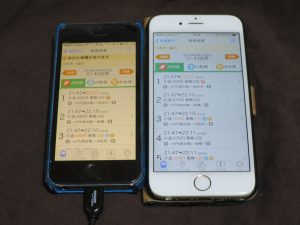
For Apple head to Settings > Display and Brightness > Blue Light Reduction
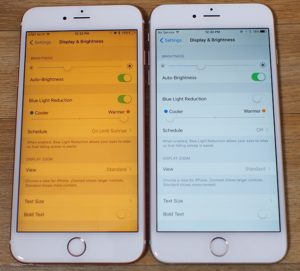
*Note: It turns the screen an orange hue so if you’re watching videos you might want to switch it off.
Bonus tip: Go outside
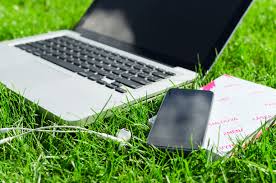
Whether it’s to soak up natural blue light or just to get some fresh air, it’s probably something we should all do a little bit more. Going outside and soaking up a bunch of blue light during the day means your body is better able to detect day and night. So when you use your phone at night, your body can ward off the effects of the blue light emitted from your screen.
Freelancers are the future, take care of yourself!
More and more people are taking to the freelance lifestyle, but as most of us know, it’s not all sitting at home in your pijamas, watching Netflix and having free time (ok, maybe it’s a little bit like that), but, if we don’t take care of ourselves both physically and mentally, we don’t have a large company to fall back on. If we’re sick or in pain and our productivity suffers than we lose money, and quickly. As I’ve said before, a freelancer’s health must be a priority, and we need to learn to take care of ourselves. I’m in this for the long haul and I’d rather prevent negative health effects than react to them when they inevitably happen (and they will happen if you don’t take care of yourself).
“If you don’t make time for exercise, you’ll probably have to make time for illness” – Robin Sharma
Improving your relationship with blue light and sleep with a few of the tricks above can be one key to help you stay healthy and productive. It might not seem like a big deal now, but in a few years, your eyes and body will be thanking you. Take care of yourself and Happy Freelancing!
Blue light and sleep, do you have any suggestions to improve them? Leave your ideas in the comments below.
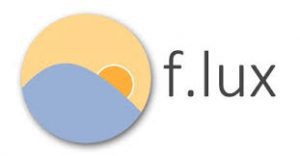
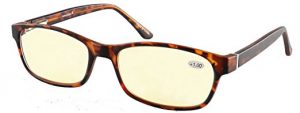
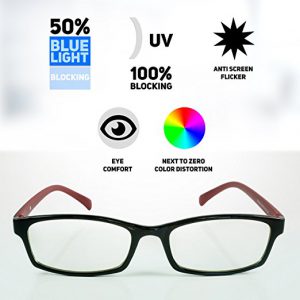
10 Replies to “Blue Light and Sleep – What’s really happening?”
Thanks for sharing this information on the effects of too much blue light exposure! It really is something I haven’t put too much thought into, but it really is an important thing to monitor. I do spend a lot of time on the computer, so getting one of the blue light filters you recommend for my laptop is something to consider for sure! The side effects are terrifying. Do you find yourself affected by any of the symptoms of blue light exposure? How do you regulate your screen time?
Hey Ciara!
I appreciate you taking the time to read and leave a comment. Fortunately, since I’ve been researching a little bit about blue light I’ve taken the steps to avoid it at certain times of the day. I actually haven’t had to set an alarm for quite a few months now since my body has found it’s natural rhythm back. I’d highly recommend getting f.lux for your computer. You really just turn it on, put in your location and it does the rest. The orange screen might be a bit weird at first but you’ll get used to it quickly.
Another thing that I do to regulate screen time is by not watching series right before bed. I usually read and I have a kindle without a back light so it doesn’t produce any blue light. That gives my body time to settle in and get ready for sleep.
I hope this helps and if you have any more questions please feel free to ask! Thank you again!
Brilliant!
This has a lot of helpful information, thanks for sharing. I’ve experienced this personally, quite a lot. When I was in college I was unaware of some of the deleterious effects of blue light on my sleeping, and couldn’t figure out the reason.
Although my sleep in the past has suffered from a number of issues, often attached to my physical, mental and sexual wellness, the blue light from a ton of exposure to screen time had a very noticeable effect as well.
My wife has used some of the programs you recommended here. My income and work has been increasingly on the computer, so I’ll need to keep this in mind.
Thanks for sharing!
Hey Jordan!
I’m glad you could find something that’s useful. Not getting good quality sleep can ruin everything else going on. I’ve been there. I’m glad that things are looking up for you and if you have any questions please don’t hesitate to ask. All the best!
Hi there. Great article. I have been looking into this issue recently as my eyesight over short distance is definitely deteriorating. Age is a factor, but I have also felt that time spent on the phone and laptop is a bigger issue.
I have been including several items in my diet that add vitamins and minerals that help the eyes, and I am sure this has prevented further deterioration. Have you done any research on this?
I like the idea of the glasses. Maybe try these out next.
Thanks again for some great information.
Best wishes, Chris
Hey!
Thank you for taking the time to leave a comment. Age probably is a factor but it looks like you’ve done your research. There are definitely vitamins that can help and even stop eyesight deterioration: vitamin A, C, E omega-3’s, zinc and a few more lesser known ones. Make sure to ask your doctor though if you’re going to add these to your diet that you ask your doctor first as they can interfere with certain medications.
The glasses are definitely useful, but when I first sit down at my computer for the day I was always forgetting to put them on! However, with f.lux everything is taken care of for you. You download the application, put in your location and depending on the time of day it is, the program adjusts the blue light coming from your screen. It’s been great for me!
Thank you again for taking the time to leave a comment, and if you have any more questions, please don’t hesitate to ask! Happy Freelancing!
This article is for me. I do a lot of computer work and I hardly ever get a good continuous rest at night. I heard about blue light before, but I now understand where it comes from and how harmful it can be. I need to get my rhythms back so this is a good investment for me. It is awful walking around all day feeling a third of myself. Thank you for this offer.
Hey!
You bet and I’m glad I could help! Thank you as well for stopping by and leaving a comment. Let me know if you ever have any questions!
Hey, I actually heard about this before, but didn’t know the exact way it does affect us, I appreciate the tips since the most I do is turn the blue light filter on my Samsung phone. I’m not sure if that is enough to help, so I will certainly try some of the things suggested here now. Thanks for this information.
Hey Victor,
I appreciate you taking the time to leave a comment. It’s really astonishing how much blue light we have around us every day from our computers, cell phones, ereaders,etc. Picking up a paperback book or not looking at your screen for a while before going to bed will really help. Good luck!